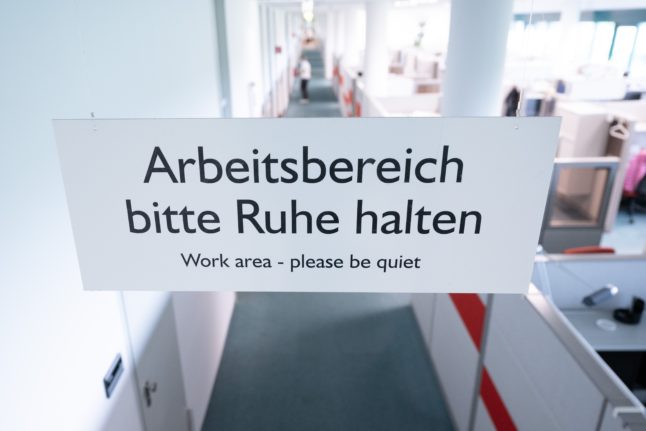What’s happening?
On Sunday March 20th, Germany’s ‘home office’ obligation was lifted, along with other restrictions.
The home office rule was brought in at the beginning of the pandemic and reintroduced in November 2021 to try and stem rising Covid infections,
It meant that throughout this winter, employers had to offer their workers the chance to work from home unless operational reasons couldn’t allow it.
Employees who had to go to their office or other workplace also had to follow strict rules – they had to carry proof of Covid vaccination, recovery or a negative Covid test (known as the 3G rule) when on-site.
The home office obligation was part of the former infection protection laws. They have now been replaced by new legislation which stipulates relaxed rules.
READ MORE: EXPLAINED – The streamlined Covid measures coming in force in Germany
Do I have to go into the office or workplace now?
If the employer wants you to work in the office, you have to go in because bosses have a so-called “right to issue instructions”. This right also means that the employer can decide where you work. If an employee still refuses to come in, he or she can be given a warning or, in the worst case, be dismissed.
However, if ‘home office’ has been working out for both the boss and worker then having a conversation with your employer to see if an agreement can be reached might be the way ahead.
Isn’t there a “right to home office” in Germany?
No. Or at least – not yet. Federal Labour Minister Hubertus Heil (SPD) wants to introduce such a right in principle and independently of the pandemic; but when this law will come into force and what exactly it will look like still isn’t clear.
READ ALSO: German Labour Minister wants to allow more remote working after pandemic
So is it still possible to work from home?
Yes, because many companies have realised that home office has its advantages. For instance, people may be happier and more productive.
The German government also says that working from home should “continue to be considered” at the moment because Covid is still around.

According to the Occupational Health and Safety Ordinance, which was also revised on March 20th, employers should at least consider whether working from home is necessary for the health and safety of their workers.
However, many collective agreements or company agreements stipulate that employees can work at least partially in a home office. You should therefore find out about the regulations in your own company.
Of course, as we mentioned above, you can also agree individually with your employer whether and how much you work in a home office. However, the employer has to get in board.
What if you are worried about catching Covid in the office?
Sorry but that alone is no reason not to come to the office (under the new legislation). But the employer has to always keep an eye on the risk to employees in the company – this is called the “duty of care”. And, according to the new work health and safety regulations, bosses should review which measures are necessary.
This includes, for example, putting up Plexiglas partitions or offering masks to the workforce. If the employee belongs to a particularly vulnerable group of people, for example if they are chronically ill, the employer may even have to continue to offer home office to protect the person.
It will cost so much to commute to the office though…
Yes, indeed. If you have to drive – especially long distances – to get to your workplace then you might ask to work from home while fuel costs are super pricey.
But unfortunately, high fuel prices are not a good reason to refuse going into the office. It is up to the employee to decide how to get to work and how much money he or she has to spend on fuel.
The employee could also search for a carpool or come to work by bicycle. As compensation for the travel costs, there is the commuter allowance. It is planned that long-distance commuters in particular will be able to deduct more from their taxes. In this way – and possibly with other measures – the government wants to “cushion” the high costs.
READ ALSO: German government announces fresh relief package for rising energy costs
Does my boss still have to offer free Covid tests?
No, this obligation has also been abolished.
However, according to the health and safety rules, employers should at least check whether one test per week is still necessary as part of the risk assessment.
But overall “3G at the workplace” rules have been dropped. This means that unvaccinated people are no longer obliged to take daily tests.
The key thing to be aware of is that now employers have to assess the risks and decide on the best course for staff rather than the government.
Wait. Haven’t Covid infections been rising in Germany?
Yes, this is the trend we’ve been seeing recently, although it is hoped Germany is through the worst of it. Experts believe the more transmissible Omicron sub variant BA.2 has been fuelling another wave of infections, although intensive care admissions have not been rising at the same rate.
Chairman of the German Federation of Trade Unions (DGB), Reiner Hoffmann, recently slammed the move to end the workplace Covid rules.
“We are seeing record infections and the situation may worsen again in the autumn,” Hoffmann told the Funke Mediengruppe newspapers at the weekend.
“I plead for the disease control law to be quickly tightened up. We must not risk the workplace becoming a hotbed of infection again,” he said.
Anything else to be aware of?
Yes, following the transition period by German states until around April 2nd, two states – Mecklenburg-Western Pomerania and Hamburg have declared them hotspots so stricter rules may apply here.
READ ALSO: The ‘hotspot’ states keeping Covid rules as restrictions end across Germany
Vocabulary
Right of instruction/right to issue instructions – (der) Weisungsrecht
Employers – (die) Arbeitgeber
Employees – (die) Arbeitnehmer
Warning – (die) Abmahnung
Duty of care – (die) Fürsorgepflicht
We’re aiming to help our readers improve their German by translating vocabulary from some of our news stories. Did you find this article useful? Let us know.



 Please whitelist us to continue reading.
Please whitelist us to continue reading.
Member comments